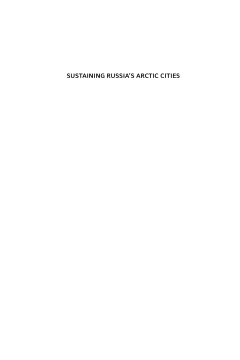
Additional Information
Book Details
Abstract
Urban areas in Arctic Russia are experiencing unprecedented social and ecological change. This collection outlines the key challenges that city managers will face in navigating this shifting political, economic, social, and environmental terrain. In particular, the volume examines how energy production drives a boom-bust cycle in the Arctic economy, explores how migrants from Muslim cultures are reshaping the social fabric of northern cities, and provides a detailed analysis of climate change and its impact on urban and industrial infrastructure.
“The contributions to the edited collection… overall provide an effective introduction to some of the key issues facing Russia’s Arctic urban regions over the short- to medium-term. They also provide a useful framework for further work focusing on the area. Orttung’s afterword makes it clear that the region’s future remains uncertain and thus presents an ongoing concern for Russia as well as the global community.” • Slavic Review
“Russia's Arctic Cities are definitely understudied, as are Arctic urban studies in general. Therefore the focus of this volume is timely and well chosen.” • Florian Stammer, University of Lapland
Robert W. Orttung is Research Director at the George Washington University Sustainability Collaborative and Associate Research Professor of International Affairs. He is the author or editor of numerous books about Russian politics and energy policy.
Table of Contents
| Section Title | Page | Action | Price |
|---|---|---|---|
| Contents | 5 | ||
| Figures, Maps, and Tables | 7 | ||
| Acknowledgements | 11 | ||
| Preface | 12 | ||
| Chapter One — Russia's Arctic Cities: Recent Evolution and Drivers of Change | 21 | ||
| Section I — Decision Making | 43 | ||
| Chapter Two — The Arctic in Moscow | 45 | ||
| Chapter Three — The Anna Karenina Principle: How to Diversify Monocities | 62 | ||
| Section II — Migration Trends in Russian Arctic Cities | 85 | ||
| Chapter Four — Boom and Bust: Population Change in Russia's Arctic Cities | 87 | ||
| Chapter Five — Assessing Social Sustainability: Immigration to Russia's Arctic Cities | 108 | ||
| Chapter Six — The Russian North Connected: The Role of Long-Distance Commute Work for Regional Integration | 132 | ||
| Section III — Climate Change | 159 | ||
| Chapter Seven — Cities of the Russian North in the Context of Climate Change | 161 | ||
| Chapter Eight — Access to Arctic Urban Areas in Flux: Opportunities and Uncertainties in Transport and Development | 195 | ||
| Chapter Nine — Russian Arctic Cities through the Prism of Permafrost | 221 | ||
| Chapter Ten — Urban Vulnerability to Climate Change in the Russian Arctic | 241 | ||
| Chapter Eleven — Conclusion: Drivers of Change | 260 | ||
| Index | 266 |
